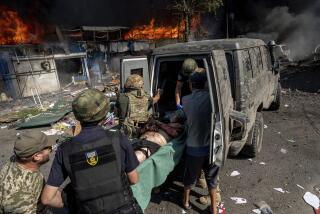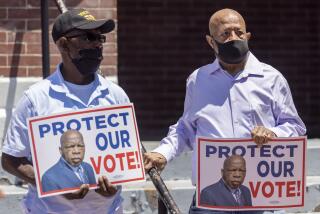Shaking Soviets Off the Fence
- Share via
Mikhail S. Gorbachev’s “Friday afternoon massacre” was a bold move by any measure. But what was behind it all?
Some interpret it as a defensive move to preempt the kind of coup that toppled Nikita S. Khrushchev. Others see it as a step toward aggressive centralization, a reversion to the old muscular style of Kremlin politics. Still others read it as a fairly normal phase in the process by which Russian rulers consolidate their power. Few consider it a watershed, however, even though there is good evidence that this is how Gorbachev sees it.
The moves are inescapably tied to the mess in the Soviet economy. The present Five-Year Plan, as revised by Gorbachev himself, called for substantial growth both last year and this. Instead, the economy has remained flat--50 factories have been declared bankrupt in the last two weeks alone; a quarter of a million young men are out of work in Azerbaijan, more in Kazakhstan; the national deficit has at least quintupled to twice the American level, and inflation is feared widely. Falling oil prices now cripple the Soviets’ ability to earn money abroad. The public, angry over the anti-alcohol campaign, refuses to buy the new savings bonds through which the government hoped to raise cash at home. Worse, there are what Gorbachev calls “acute shortages” of food. No wonder Pravda declared that the crisis has gained “political meaning.”
How has the Gorbachev administration responded to these gathering thunderclouds? Millions of administrators at all levels have simply done nothing. There have been ringing calls to action from on high, but lower officials have “dragged their feet” and attempted to let the crisis roll by “like water off a duck’s back,” as Gorbachev told a group of editors. The public, too, has hesitated to respond to many of the free-market initiatives that the government has opened to it. Such inaction exposed Gorbachev’s powerlessness.
What accounts for the passivity of those who should have acted? Many, but by no means all, are genuinely threatened by reform. Others, both in the government and in society at large, lack the initiative to act on their own--or so Kremlinologists never tire of telling us, contrasting the Soviet situation to the burst of individual initiative in China. But this is not Gorbachev’s reading. Instead, he has concluded that millions of officials and ordinary citizens are hedging their bets in fear that some new change of leadership will leave them high and dry.
More than native skepticism is to blame. People were hedging their bets, Gorbachev charged during his visit to Krasnoyarsk, because various officials have been “sowing doubt” and “confusing people.” He had in mind his colleague Yegor K. Ligachev, who since last spring has been cautioning against reckless change and generally leading a “What’s Right With the U.S.S.R.” campaign. As long as Ligachev got by with this, he looked like a rising threat to Gorbachev. At the least, his campaign confused the signals being sent to lower officials and the public, who all hunkered down.
Contrary to some claims, no evidence has yet surfaced that Ligachev was preparing a coup. Faced with domestic chaos, and having publicly declared that reform had reached a “watershed,” Gorbachev himself orchestrated a coup.
Carried out in the name of greater democracy, Gorbachev’s coup was purely Stalinesque in character. Like Josef Stalin, he struck first against the left, demoting the outspoken Moscow party chief, Boris Yeltsin, last year. Now he has moved against the right in the person of Ligachev, using hastily called meetings and rigged votes and brooking no discussion. Doing Stalin one better, Gorbachev did not fire his irksome colleague but put him in charge of the food supply, which Gorbachev has named “our most serious day-to-day problem.” With the same spirit of irony, he pulled Viktor M. Chebrikov, a Ligachev ally, from his post as KGB head and named him to chair a commission on legal reform. Both must now realize that they will either do Gorbachev’s bidding or be fired.
What is the upshot of these moves? First, and most important, they signal to all fence-sitters that there is no way out of the present crisis except through Gorbachev’s program of reform. Second, they strengthen Gorbachev and, ironically, enhance the centralization that is necessary if decentralizing reforms are to be instituted. Third, and most paradoxical, by asserting control over the Ligachev faction, Gorbachev is now free to take over any part of its program he wants without endangering his own power.
It is worth recalling that Gorbachev’s most impatient calls for change and his most outspoken criticism of traditionalists came not before, but after he demoted the radical Yeltsin. Now that he has gained a leg-up on Ligachev and Chebrikov, it would not be surprising if Gorbachev tries to preempt at least part of their program.
With luck, this stratagem may gain Gorbachev enough breathing space to face the economic crisis, promote his own program of reform and begin addressing the mounting demands of the non-Russian republics as well. This, at any rate, appears to be his hope.
More to Read
Sign up for Essential California
The most important California stories and recommendations in your inbox every morning.
You may occasionally receive promotional content from the Los Angeles Times.













